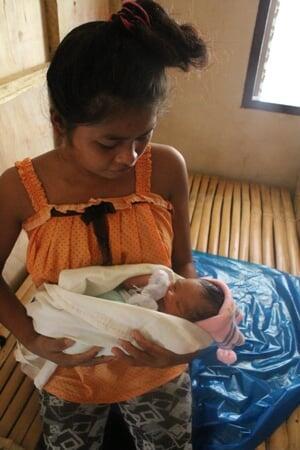SITIO GAWASAN, Philippines – The road from Sitio Gawasan to the nearest village health centre is a long one.
Accessible only by foot or a bumpy motorcycle ride through unpaved muddy roads, the journey can take up to four hours, a risk few expectant mothers can afford to take. But the opening of a new birthing facility in Gawasan has changed the lives of the local indigenous Arumanen community.
When an old structure in the sitio (a remnant of a government project) was turned over to them last year, local Arumanen leaders earmarked the space for a birthing facility and health centre. With the support of UNFPA, the National Commission on Indigenous Peoples (NCIP), and the EU-funded Indigenous Peoples Maternal, Neonatal, Child Health and Nutrition Project in Mindanao (IP MNCHN Project-Mindanao), the new culturally-sensitive facility is now a reality.
The new centre provides pregnant indigenous women an alternative to home delivery and, for example, offers them the option to choose between giving birth on a ‘native’ delivery bed made of bamboo or on a ‘standard’ delivery bed.
Emily Baluan, a midwife deployed by the Department of Health and herself an Arumanen, helped to design the special bamboo delivery bed favoured by many indigenous women. Under her guidance and with the blessing of the tribal elders, the local community put up the walls, repaired faucets and fixtures, and improved the overall structure of the edifice.
“We are very happy because now we have something to use here at the centre,” said Araceli Cawag, President of Sitio Gawasan Women’s Association and a community health team trainer.
By the community, for the community
Because the birthing facility was initiated and developed by the Arumanens, the centre is sensitive to their particular needs and culture.
Tibal Chieftain Timuey Elino Pendaupan explained that if there is a problem during childbirth, the Arumanens usually perform a ritual for the mother and baby. The new birthing facility accommodates these traditions and has an outdoor space for the family to perform these rites.
The centre also facilitates other customs, like having a traditional birth attendant accompany the expectant mother.
“Women’s support systems, especially their families, are welcome here,” Ms. Baluan explained.
Aileen, one the young mothers who just gave birth in the new facility, doesn’t want a big family. When the time comes, she will visit the centre to get support with family planning services and for her baby’s immunizations.
The new birthing facility, along with better equipment and supplies, have paved the road for better health care for Aileen, her daughter, and the entire Arumanen community in Gawasan.
The Indigenous Peoples Maternal Neonatal and Child Health and Nutrition (IP MNCHN) project is funded by the European Union. It is implemented by the National Commission on Indigenous Peoples and jointly managed by UNFPA.


